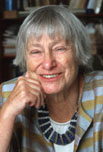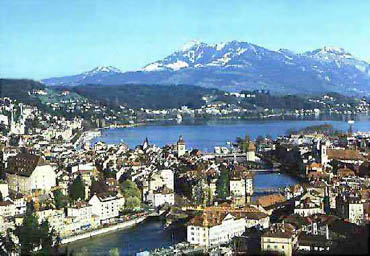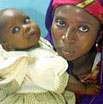 |
||||||||||
|
||||||||||
| ILRS Congress To Take Place in Lucerne, 15-17 August 2003 |
In August the International League of Religious Socialists (ILRS) will hold its triennial Congress in Lucerne, Switzerland.
It is quite appropriate that we should meet in Switzerland, because it is in Switzerland that so much of the inspiration for our movement began, through the work of Leonhard and Clara Ragaz. Indeed, Switzerland hosted many of the very first religious socialist conferences in the world in the 1920s, and the idea of bringing together socialists of different faiths began in no small part through the dialogue between Ragaz and Martin Buber. It is in this spirit of dialogue and understanding that we continue our work today.
|
|
|
The case of Amina Lawal has brought international attention to the use of Sharia law in certain Nigerian states, as well as in other parts of the world. Amina Lawal is a 30-year old woman from the northern Nigerian state of Katsina. In March of 2002 she was sentenced to death by stoning, under the penal code of Islamic Sharia law which is now the law of that state. She is currently awaiting an appeal of her case, scheduled now for 27 August 2003. |
Remembering Dorothee Sölle |
(Man kann hier den ganzen Artikel auf Deutsch lesen.) This sentence, that Mammon always kills more children, is ever more true, more valid. We live in a new epoch, which in many senses is more barbaric than the earlier forms of capitalism. I was an ardent adversary of the 'Adenauersystem', because the price of its econnomic miracles was engaging in the arms trade, but today I find that I am a bit nostalgic with respect to 'Rhein capitalism', how one from that time kindly called it, because it at least connected the interests of capital with social welfare and a responsibility for the weaker among us. |
| Fundamentalism in the Roman Catholic Church Frances Kissling |
Frances Kissling is a feminist and the President of Catholics for a Free Choice. The rise of religious fundamentalism over the past decades has been a complex political phenomenon. It encompasses a religious ideology in which both family life and political organization are subject to an ultra-conservative belief in male control combined with a rejection of both democracy and women’s rights and a political ideology which demands a state structure in conformity with conservative religious views. While there are elements of the religious fundamentalist analysis of the modern state that are shared by progressives (disgust with government corruption, consumerism and materialism and among third world fundamentalists a rejection of U.S. imperialism), the two worldviews are polar opposites. The most troubling forms of religious fundamentalism for progressives are Christian fundamentalism which is most active in the United States and in Latin America and Islamic fundamentalism such as that practiced in Afghanistan under the Taliban. Christian fundamentalists have been closely associated with U.S. political conservatives from Ronald Reagan through the current President George Bush. They have espoused economic policies that favor the rich and ignore the needs of the poor. They have exported their religion throughout Latin America and allied themselves with the most undemocratic regimes in the region. Islamic fundamentalists have sought, often through religious political parties, but sometimes through vigilantism and violence, state control over all aspects of political and social life in ways that reject the civil liberties and human rights of all who disagree. This fundamentalist agenda is rejected by justice-seeking people. But progressive people engaged in the struggle against globalization and for social and economic justice have a much harder time understanding and rejecting the fundamentalism of the Roman Catholic church. U2’s Bono meets with the pope and together they call for the eradication of third world debt; bishops, such as Don Samuel Ruiz in Mexico and Casaldilga in Brazil, are prominent in the struggle for indigenous people’s rights. The Vatican and the bishops are powerful and to the extent they share our goals, we want to keep them on our side. Thus, many progressives tend to ignore the increasing fundamentalist tendencies in the church. They were always there. From the conversion of Constantine in the fourth century, Catholicism’s trajectory shifted from that of a counter culture movement on the fringes of Judaism to a state religion with all the trappings of a European monarchy. In the papacy of John Paul II, all the characteristics of fundamentalism thrived. This was of course, the triumphant anti-communist pope, and we all know anti-communism is not to be confused with democracy. But we cannot ignore Roman Catholic fundamentalism for it is a danger to two critical values of the progressive movement: the lay state and women’s rights, especially sexual and reproductive freedom. Like U.S. Christian and Islamic fundamentalists, the Vatican believes the modern state has failed it. From the UN to Ireland to Mexico laws do not conform to the church’s vision of family and male and female roles; men are no longer in charge. A fragile international consensus is developing. It supports the idea that marriage can fail and that couples should be allowed to divorce and remarry. Men and women should have access to modern contraception so that they can decide on the number ofchildren they want and when they want them. Women who have been raped, and those who have not, should have access to emergency contraceptives that will prevent pregnancy. Women should not die from botched illegal abortions. Adolescents have the right to a sexual life, to contraceptives. They have rights that are separate from those of their parents. People at risk of AIDS should have access to condoms. Gay, lesbian, bisexual and transgendered people have the right to a family, children and social benefits, even the right to marry. The Catholic church’s reaction to this shift in social and political acceptance of sexual and reproductive freedom has been fundamentalist. In Kenya, a prominent bishop has burned condoms; in Mexico, the much respected Samuel Ruiz threatened to excommunicate any legislator in Chiapas who voted to retain a law that legalized abortion in that state. Throughout the world, church social service providers are forbidden from educating about or providing condoms to those at risk of AIDS. So extreme is the prohibition on providing condoms for AIDS that when a Catholic doctor asked if he could ethically advise a couple to use condoms when the husband, a hemophiliac, was diagnosed with HIV, he was told no. That couple is called to celibacy, the Vatican said. But, if celibacy would result in divorce, then the couple should have sex to avoid it. However, they should not use a condom. During the war in Bosnia, the pope wrote an open letter to women who have been raped and become pregnant. Do not have an abortion he begged. Rather turn the act of rape into an act of love by making the child flesh of your flesh, he said. In the European Union, the Vatican lobbied heavily against gay unions and gay marriage. It seeks the right to discriminate against gay employees in church programs that receive EU funding. In Poland, the church supported government measures that would eliminate day care and force women out of the workplace. In Chile, it lobbies against laws that would permit divorce. In the Philippines, it demands that the government not provide any family planning education or services other than abstinence. In the United States, it refuses to provide voluntary sterilization in Catholic hospitals and emergency contraception to women who have been raped. Is this really much different than the Taliban who refused to allow women to go to school, or Nigerian fundamentalists who wanted to stone a woman who had been raped, because she became pregnant? Within the clergy, serious violations of women’s and children’s rights are perpetrated. Two successive reports of the sexual exploitation of Roman Catholic nuns by priests in 23 countries were ignored by the Vatican. The reports included substantial documentation of African nuns who were exploited by priests who were afraid of getting AIDS from prostitutes and forced nuns to have sex with them. Sisters who became pregnant were sometimes forced to have abortions. Many who carried the children to term were dismissed from their religious orders and sent home to their villages with no financial support. Of course, nothing happened to the priests who made them pregnant. Nuns contracted AIDS and died. A year after these cases were reported, the scandal of clergy sexual abuse was revealed in the United States. Extensive research by Catholics for Free Choice identified over 5,000 cases in press reports from 1995 to 2002. The Vatican claimed that the problem was a small one and the church was being singled out unfairly by the media. The only global response has been to transfer priests who abused children from one country to another to avoid prosecution. Just as drug companies send their outdated and ineffectual drugs to the developing world, so the church sends its dysfunctional priests to Mexico, the Philippines and other countries. Of course, the church has lost the confidence of Catholic people. When it forbade contraception in 1968, many Catholics simply ignored the prohibition and use pills, diaphragms and condoms. In the UN, its anti-family planning efforts are supported, not by Catholic countries, but by conservative Islamic states. But having lost the moral war, the Vatican has turned to the United Nations to influence international public policy on the family, sexuality and reproduction. Beginning at the 1992 Rio Conference on the Environment, the Vatican has used its non-member state permanent observer status to preach against policies that would save lives and respect the human rights of men and women. The “state” status of the Vatican is unique. No other religion holds this status. The only other state in this category is Switzerland and that is changing. Soon the only Non-member State Permanent Observer will be the Holy See, as the Vatican is called in the UN. Why is a religion that occupies a mere 108 acres of tourist attractions and office buildings in the center of Rome and a population of less than 1,000 people, the vast majority of them men, considered a state in the UN system. First and foremost because it aggressively sought this status. Second, because it has some functions that are similar to state functions—a radio station and post office—and was invited by the UN to participate in specialized UN bodies dealing with these issues. One of the benefits of non-member state status is the ability to participate in UN conferences such as the conferences of the 1990s—on population, women, human rights and social development. In each of those conferences it has sought to limit the right to health care—and the right to life. For example, at the Cairo conference on population and development, the Holy See claimed that condoms cause AIDS and should not be a part of international AIDS prevention programs. At the women’s conference in Beijing, it refused to accept the statement that women’s rights are human rights, calling instead for language that would state that men and women were equal in dignity. In Europe, it seeks recognition in the Charter of Rights that the “Christian roots” of Europe be recognized and maintains a mission at the Council of Europe, actively lobbying for both funding of church agencies and conservative social policy. From country to country, it enforces concordats that give it special privileges. A growing progressive Catholic movement is working to limit the fundamentalist side of the Catholic church and ensure that other voices, especially those of Catholic women are heard in the UN. Through a “See Change” campaign it is asking the Secretary General to review the category of non-member state permanent observer held by the Holy See. It claims that the status is unfair. No other religion is so represented in the UN. Perhaps a body that considers itself infallible is unable to negotiate and compromise on issues it sees as “divine.” The campaign has been endorsed by about 1,000 groups and tens of thousands of individuals. The church could be an important force for peace and justice. In the modern world this requires more than debt reduction and poverty alleviation. It requires an end to fundamentalism, a respect for pluralism, a tolerance for differences. Until the church shows itself to be committed to these values, it will be fair to call it fundamentalist. It is also important that those who support these values, Catholic or non-Catholic, work to change the church. |
This site was created and designed by Andrew Hammer
©2006 ILRS

